|
|
|
Sort Order |
|
|
|
Items / Page
|
|
|
|
|
|
|
| Srl | Item |
| 1 |
ID:
157537
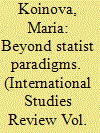

|
|
|
|
|
| Summary/Abstract |
This article presents a new positional perspective for the analysis of diaspora mobilization in international relations (IR), seeking to shift debates beyond realist, liberalist, and constructivist thinking, and speaking to a cluster of sociopositional theories in IR. It provides a conceptual discussion and empirical illustrations of diaspora positionality—the power diaspora activists derive from their sociospatial positions in particular contexts—and its utility to account for different mobilization trajectories. Positionality as a sociospatial concept offers opportunities to analyze diaspora politics beyond statist paradigms, dominated by analyses of triadic relationships between diasporas, host states (immigration states), and home states (sending states). Diasporas have links to many contexts beyond host states and original home states. Such linkages structure their relationships globally. If diaspora entrepreneurs perceive themselves as deriving strong powers to achieve homeland-oriented goals from a particular sociospatial context, they are more likely to pursue claims through institutional politics and moderate means. If they perceive themselves as deriving weak powers from a context, they are more likely to engage with activist networks and pursue claims in transgressive ways. The conceptual discussion engages aspects of diaspora positionality in juxtaposition with other spatial concepts such as geographical proximity/distance and position in a social network. The empirical discussion brings patterns of mobilization trajectories from the Armenian diaspora mobilization for genocide recognition and the Palestinian diaspora mobilization for statehood, informed by a rich multisited fieldwork.
|
|
|
|
|
|
|
|
|
|
|
|
|
|
|
|
| 2 |
ID:
101752
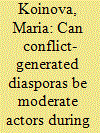

|
|
|
|
|
| Publication |
2011.
|
| Summary/Abstract |
Conflict-generated diasporas are considered likely to maintain radical behaviours. This article seeks to explain why and how they nevertheless adopt moderate claims, especially when advocating highly sensitive issues such as state sovereignty. Focusing on groups in the US I investigate the Lebanese diaspora linked to the pro-sovereignty movement in Lebanon (2000-2005) and the Albanian diaspora linked to Kosovo's independence movement (1999-2008). The contentious episodes take place during the original homeland's post-conflict reconstruction. Embedded in the literatures on diasporas, conflicts, and transnational social movements, this article argues that instrumental approach towards the achievement of sovereignty explains why conflict-generated diasporas adopt moderate behaviours. Diasporas hope that by linking their claims to a global political opportunity structure of 'liberalism' they 'play the game' of the international community interested in promoting the liberal paradigm, and thus expect to obtain its support for the legitimisation of their pro-sovereignty goals. Diaspora entrepreneurs advance their claims in a two-step process. Initially they use frame bridging and frame extension to formulate their existing grievances. Then, an increased responsiveness from their host-state emerges to sustain their initial moderation. While individuals or groups in diaspora circles occasionally issue threats during the contentious episodes, the majority in the diaspora consider moderate politics as their dominant behaviour.
|
|
|
|
|
|
|
|
|
|
|
|
|
|
|
|
| 3 |
ID:
106221
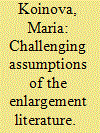

|
|
|
|
|
| Publication |
2011.
|
| Summary/Abstract |
This article argues that from the very start of the transition process in Macedonia, a fusion of concerns about security and democratisation locked local nationalist elites and international organisations intoa political dynamic that prioritised security over democratisation. This dynamic resulted in little progress in the implementation of human and minority rights until 2009, despite heavy EU involvement in Macedonia after the internal warfare of 2001. The effects of this informally institutionalised relationship have been overlooked by scholarship on EU enlargement towards Eastern Europe, which has made generalisations based on assumptions relevant to the democratisation of countries in Eastern Europe, but not the Western Balkans.
|
|
|
|
|
|
|
|
|
|
|
|
|
|
|
|
| 4 |
ID:
124616
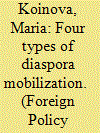

|
|
|
|
|
| Publication |
2013.
|
| Summary/Abstract |
This comparative study explores the conditions and causal pathways through which conflict-generated diasporas become moderate or radical actors when linked to homelands experiencing limited sovereignty. Situated at the nexus of scholarship on diasporas and conflict, ethnic lobbying in foreign policy, and transnationalism this article develops four types of diaspora political mobilization-radical (strong and weak) and moderate (strong and weak)-and unpacks the causal pathways that lead to these four types in different political contexts. I argue that dynamics in the original homeland drive the overall trend towards radicalism or moderation of diaspora mobilization in a host-land: high levels of violence are associated with radicalism, and low levels with moderation. Nevertheless, how diaspora mobilization takes place is a result of the conjuncture of the level of violence with another variable, the linkages of the main secessionist elites to the diaspora. The article uses observations from eight cases of Albanian diaspora mobilization in the US and the UK from 1989 until the proclamation of Kosovo's independence in 2008.
|
|
|
|
|
|
|
|
|
|
|
|
|
|
|
|
| 5 |
ID:
148172
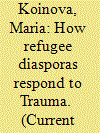

|
|
|
|
|
| Summary/Abstract |
The kind of support refugees receive to help them deal with the stresses of displacement can determine whether they will be a constructive or a divisive force.
|
|
|
|
|
|
|
|
|
|
|
|
|
|
|
|
| 6 |
ID:
185788
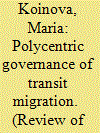

|
|
|
|
|
| Summary/Abstract |
State and non-state actors interact in both formal and informal ways during migration governance. Yet, we know little about such interactions, especially in the field of transit migration, a largely regional phenomenon. Here the categories of migrants are fluid between refugees, regular and irregular migrants, including those from conflict regions. Governance takes place also informally. Building on relational theories in International Relations, this article introduces a novel relational approach to polycentric governance. I argue that at the centre of such governance are not simply institutions or migration regimes, but power-laden relations among governmental, non-governmental, supranational, and non-state actors, as well as sending and destination states. These form architectures of partially official, partially informal dynamics that govern transit migration in a particular world region. Such architectures are based on mechanisms of cooperation, conditionality, containment, contestation, and others, combined in regionally specific ways. The mechanisms manifest themselves differently depending on how actors are embedded in places with different political regimes and statehood capacities. The article illustrates this relational perspective to polycentric governance with comparative evidence from the Balkans and the Middle East.
|
|
|
|
|
|
|
|
|
|
|
|
|
|
|
|
| 7 |
ID:
159880
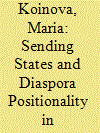

|
|
|
|
|
| Summary/Abstract |
Diaspora politics is of growing interest to international relations (IR), yet theorizing about sending states’ engagement of diasporas in different global contexts has been minimal. Central to this article is the question: how do challenges to postconflict statehood shape a sending state's diaspora engagement? I provide a fresh sociospatial perspective on “diaspora positionality,” the power diaspora political agents amass or are perceived to amass from their linkages to different global contexts, which speaks to utilitarian, constructivist, and governance rationales and to emerging IR relational and positional theories. This power is relative to that of other actors in a transnational social field, in which sending states and diasporas operate globally: it is sociospatial, defined by social relationships among diasporas across the globe and by their linkages to specific spatial contexts. I argue that postconflict states view the positional empowerment of diasporas in distant locations as an asset to their statebuilding. Diasporas are not controlled but involved in extraterritorial processes through partially rationalized, partially implicit governance practices. The article focuses on Kosovo as a postconflict de facto state and brings evidence from extensive multisited fieldwork in Kosovo in 2013, and the UK, United States, Sweden, Germany, France, the Netherlands, and Switzerland in 2009–17.
|
|
|
|
|
|
|
|
|
|
|
|
|
|
|
|
| 8 |
ID:
108677
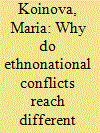

|
|
|
|
|
| Publication |
2009.
|
| Summary/Abstract |
Why did ethnonational conflicts reach different degrees of violence during the 1990s: high in Kosovo, middle-ranged in Macedonia, and low in Bulgaria? This article analyzes the relationship between the Albanians of Macedonia and Kosovo, the Turks of Bulgaria, and their respective states. Challenging democratization and security dilemma theories, it argues that the relative changes in minority rights compared to the communist period, rather than the absolute scope of minority rights granted by the new constitutions, created a political threshold early in the transition period that propelled causal chains of minority-majority interactions that led to different degrees of ethnonational violence. Combined with the status change, governmental strategies of co-optation, or coercion prompted the minorities to pursue their demands either through the institutions of the state (Bulgaria), through clandestine activities (Kosovo), or through a combination of both (Macedonia). This article also argues that a timely governmental response to nonterritorial minority demands prevented them from expanding to become territorial and from triggering higher levels of violence.
|
|
|
|
|
|
|
|
|
|
|
|
|
|
|
|
|
|
|
|
|